The King Bees
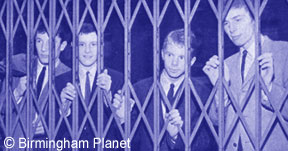
BIRMINGHAM
Revised February, 2011
Geoff Brown lead vocal, guitar
Richard Pannell guitar
Graham Smith drums (left in 1965)
Colin Timmins bass guitar (left in 1965)
Len Cox bass guitar (joined in 1965)
Carl Palmer drums (joined in 1965)
"We auditioned lots of players including a 15 year old from Handsworth but I was very impressed with him. His name was Carl Palmer"
This group originated from a band called The Castaways who were formed in the early 1960s. The King Bees are significant in rock music history as one of the earliest bands to feature drummer Carl Palmer who went on to fame and fortune in the progressive rock band "Emerson, Lake & Palmer". Geoff Brown who was lead vocalist for The King Bees has provided much assistance in writing the story of the band as follows:
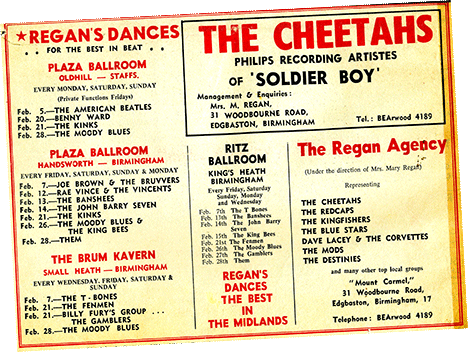
By early 1964, The Castaways changed their format to a blues-based group and were now known as "The King Bees". The line-up at this time consisted of Geoff Brown (lead vocal/guitar), Richard Pannell (lead guitar), Graham Smith (drums), and Colin Timmins (bass guitar). This stayed the same until mid 1965 when Colin Timmins left as he wasn't really into the blues music and Len Cox joined on bass.
Len Cox still has vivid memories of those days. Len; "I joined the King Bees in 1965 having met them at a gig at 'The Bournbrook' in Selly Oak. I was knocked out by their blues sound and excited by the prospect of getting in on 'their act' playing bass. The music landscape in Birmingham was alive with exciting bands and we were forerunners along with the Spencer Davis Group on the emerging R&B scene."
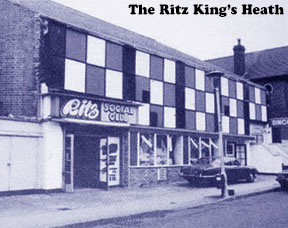
Geoff Brown remembers those days as follows; "Blues music and the mod-scene was really taking off in Birmingham and we were starting to make a name for ourselves along with another up and coming band, The Spencer Davis Group. I have a flyer from The Ritz with The King Bees headlining on Friday 16th October 1964. I also have a card of the King Bees with Alan Clayton's address on it as he started to manage the band around that date."
Blues music was particularly popular amongst university and college students during the mid 1960s. Consequently, there were many bookings for The King Bees on the university circuit such as The 5th House Club at Birmingham University where they played in 1966. Geoff Brown; "We really came to establish ourselves at the time as one of Birmingham's top blues bands and headlined lots of clubs and pubs in the area."
Towards the end of summer 1965, drummer and founding member Graham Smith decided to leave the group. The search was now on for a worthy replacement! Geoff Brown; "Graham Smith left the band and we looked around for another drummer. We auditioned lots of players including a 15 year old from Handsworth who came with his dad, but I was very impressed with him. His name was Carl Palmer. He joined us a couple of weeks later. I still have a newspaper cutting with Carl in the group from the Birmingham Planet dated September 30th 1965."
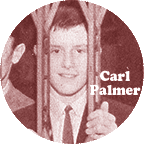
*Carl Frederick Kendall Palmer was born in Birmingham, England, on March 20th, 1950 and lived in Silvercroft Avenue, Handsworth. He was brought up into a musical family with both his mother and father playing a variety of instruments.
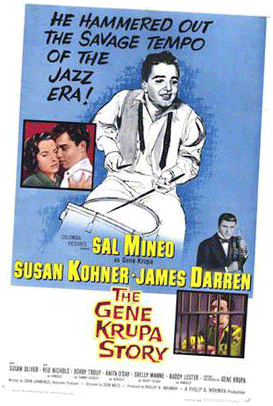
Carl's interest in music started at an early age but it was classical violin that he initially took up. In 1959, Carl went with his father to The Odeon Cinema on Soho Road and saw a film about American jazz drummer Gene Krupa which inspired him to learn the drums with both Krupa and Buddy Rich soon becoming his biggest influences.
Carl Palmer received a set of drums for his 11th birthday and took lessons from local instructor Tommy Cunliffe. Displaying a natural talent for the drums, it wasn't long before Carl began performing with his father's dance band. He must have been good for by age 14, Carl gained a six-month stint with the local Mecca Dance Band - his first professional gig for which he was paid the then-incredible sum of 23 pounds a week!
"We try to develop our own style although we are influenced by Howlin' Wolf and Ray Charles"
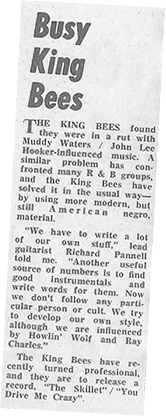
The King Bees were interviewed for a feature written about them in The Birmingham Planet newspaper. The group was asked if they were concerned about getting "stuck in a rut" by playing too many John Lee Hooker or Muddy Waters numbers as was the case with other R&B groups at the time.
Richard Pannell said; "We have to write a lot of our own stuff. Now we don't follow any particular person or cult. We try to develop our own style, although we are influenced by Howlin' Wolf and Ray Charles."
In the period following Carl Palmer joining The King Bees, their bookings continued to grow. Geoff Brown had started going to University but still somehow managed to find time to perform with the group.
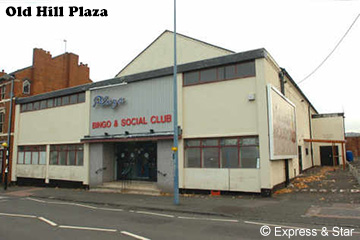
Len Cox recalls; "We had a good following playing 6-7 nights a week and sharing gigs with many of the chart bands of the day on the Ma Regan circuit (Plaza Old Hill & Handsworth, Ritz Kings Heath and Cavern Small Heath). Also, all the blues clubs including the famous 'Whisky A Go Go' in John Bright Street where we shared a residency with the Spencer Davis Group. We played the all-night blues sessions at Birmingham Town Hall alongside top bands from London, including Chris Farlowe who we got to know and who snapped up Carl Palmer when we broke up."
The King Bees made some demo recordings at Domino Studios in Albrighton but nothing from these sessions was ever released. By February 1966, their manager Alan Clayton had introduced the group to influential record producer Larry Page who had worked with both The Kinks and The Troggs.
Larry Page signed The King Bees to a recording contract with the Fontana Records label and soon after, changed the group's name to "Craig". This was the line-up who recorded what is regarded by many as one of the earliest and best British psychedelic/rock tracks of the 1960s! (see Craig).
Many thanks to Geoff Brown for his assistance in preparing the King Bees story and providing images of the group shown here. Thanks also to Len Cox for sending additional information.
*additional info from the official Carl Palmer web site at: www.carlpalmer.com
You can visit Geoff Brown's MySpace music page at: myspace.com/geoffbrownrecords
If you would like to contribute to this page, please e-mail john@brumbeat.net
Copyright © John R Woodhouse